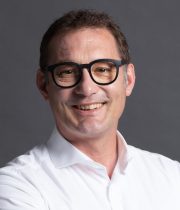CNS THERAPEUTICS XCHANGE
EUROPE 2022
Zurich, November 24
Welcome to hubXchange’s Europe CNS Therapeutics Xchange 2022, bringing together executives from pharma and biotech to address and find solutions to the key issues faced in developing CNS therapies.
Discussion topics will cover Novel Targets, Preclinical, Clinical Studies and Drug Delivery.
Take advantage of this unique highly interactive meeting format designed for maximum engagement, collaboration and networking with your peers.
Please note this is an In-Person meeting.
VENUE DETAILS: Hilton Zurich Airport Hotel, Hohenbuehlstrasse 10 – 8152 Opfikon, Switzerland
Novel Targets
8:30 – 9:00
Opening Address & Keynote: EEG biomarkers: a predictive tool to bridge the gap between the preclinical and the clinical drug development
- EEG as a source of translational biomarkers for drug discovery & development
- Case study in Parkinson’s disease
- Case study in Rare diseases
Applications Specialist & Business Development, SynapCell
Maïtena holds a MSc in Management of Biotechnology and a Master’s degree in International business in Science. She joined SynapCell as Junior Business Developer in 2021 and was recently appointed as Applications Specialist. Her background provides her with dual skills to better understand the current needs of the biopharma industry towards drug discovery for CNS disorders. Her willingness to learn and to move EEG applications forward makes Maïtena a great asset from the valorization of SynapCell’s cutting-edge research from R&D projects to the development of new solutions’ scientific launch packages.
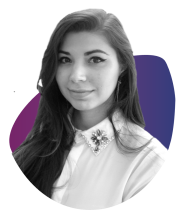
Head of Scientific Sales, SynapCell
Venceslas holds a PhD in Neuroscience and Neuropharmacology from the University of Bordeaux, France. He then undertook his post-doc at the Institute of pharmacology and toxicology at the University of Zurich. Venceslas has been working at SynapCell since 2012, first as Neuroscientist then as Head of Science. In May 2021, he was appointed Head of Product and Portfolio Management and moved to sales as Head of Scientific Sales in 2022. Venceslas therefore brings more than 10 years’ experience in drug discovery and brain disorders. As SynapCell’s Head of product and portfolio management, he is at the cutting edge of Neuroscience research through the implementation of drug discovery programs for customers or for internal R&D projects.
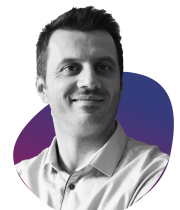
9:05 – 10:05
Opportunities from emerging therapeutic modalities: Target selection in an evolving druggability landscape
- Choosing the “Right candidate” target gene, with understanding of the disease with implications of modulation in CNS.
- Drug testing using disease relevant model system that shows not just a part but as close to human disease phenotype.
- Drug delivery approaches
- Efforts on choosing the appropriate biomarker for preclinical and clinical evaluation.
Senior Research Scientist, AstraZeneca
Vijay Chandresekar, is currently a Senior Scientist with the MS&B function at AstraZeneca, Sweden. He did his Ph.D in Neuroscience from the University of Fribourg, Switzerland and Postdoc studies in Columbia University, New York, USA and University Hospital Zurich, Switzerland and as a senior Postdoc/scientist at DZNE, Bonn, Germany in Neurodegenerative diseases like ALS, Prion and Alzheimers diseases as well as ageing & inflammation. He has over 17 years of working experience in Neurological and Neurodegenerative diseases. He is passionate about and has been continuously working towards better and efficient CNS therapeutics as well as understanding the disease mechanism.

The relevance of EEG biomarkers to address CNS drug discovery challenges
- Can EEG biomarkers participate to the phenotyping of a model
- Beyond the trace : explore different kinds of applications for EEG Phenotyping
- What type of therapeutic areas are still out of reach for the EEG technology ?
Applications Specialist & Business Development, SynapCell
Maïtena holds a MSc in Management of Biotechnology and a Master’s degree in International business in Science. She joined SynapCell as Junior Business Developer in 2021 and was recently appointed as Applications Specialist. Her background provides her with dual skills to better understand the current needs of the biopharma industry towards drug discovery for CNS disorders. Her willingness to learn and to move EEG applications forward makes Maïtena a great asset from the valorization of SynapCell’s cutting-edge research from R&D projects to the development of new solutions’ scientific launch packages.

Head of Scientific Sales, SynapCell
Venceslas holds a PhD in Neuroscience and Neuropharmacology from the University of Bordeaux, France. He then undertook his post-doc at the Institute of pharmacology and toxicology at the University of Zurich. Venceslas has been working at SynapCell since 2012, first as Neuroscientist then as Head of Science. In May 2021, he was appointed Head of Product and Portfolio Management and moved to sales as Head of Scientific Sales in 2022. Venceslas therefore brings more than 10 years’ experience in drug discovery and brain disorders. As SynapCell’s Head of product and portfolio management, he is at the cutting edge of Neuroscience research through the implementation of drug discovery programs for customers or for internal R&D projects.

Networking Lunch
Spotlight Presentation:
The effect of CNS-acting drugs on rodent mismatch negativity is modulated by vigilance states
- Mismatch negativity (MMN) is a component of event-related potentials that is diminished in many neuropsychiatric disorders including schizophrenia.
- Central nervous system (CNS)-acting drugs often alter vigilance states, and it is not well understood how the drug-induced changes in sleep-wake behaviour affect MMN
generation. - The presentation will provide an overview of the recent rodent MMN research with a
special focus on vigilance state specific changes and discuss the methodological
aspects and future implications of the latest findings.
Scientific Lead, Transpharmation
Sandor has over 20 years’ experience in neuroscience research, published more than 20 research articles and was awarded with theprestigious Pickwick Fellowship of National Sleep Foundation to study the neurobiology of narcolepsy at Harvard Medical School. Prior to taking up his post at Transpharmation, Sandor held a research role at Cambridge University where he identified the abnormal changes in sleep and brain oscillations in Huntington’s disease as well as the drugs that can reverse them. As Scientific Lead at Transpharmation he is responsible for directing sleep-wake profiling and EEG assessment of novel, CNS acting compounds.
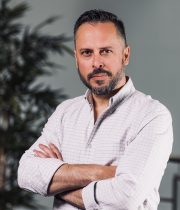
1-2-1 Meetings / Networking Break
1-2-1 Meetings / Networking Break
15:00 – 16:00
Novel therapies for complex neurological disorders: discovery of effective treatments
- What relevant novel CNS disorders and therapies are currently under development
- What are novel trends in CNS disorder diagnostics and drug development?
- How do you see the future for developing successful CNS therapies?
Senior Clinical Program Director Paediatrics-Neurology Patient Value Unit, UCB Biosciences GmbH
Frank Tennigkeit is a Drug Development Expert with more than 25 years of experience in the life sciences including more than 15 years of pharmaceutical industry/biotech experience.
His medical background comes from Pharmacology and Neuroscience. He has strong experience in clinical development and real world evidence generation, especially in Neurology (Alzheimer’s Disease, Epilepsy, Parkinson’s Disease and PSP) and orphan autoimmune disorders.
Currently he works for UCB Biosciences as Pediatric Development expert (pediatric development plans, PIPs, PSPs and indication expansions). He has also been Medical/Clinical Team Lead and manager of cross-functional teams.
He has extensive experience in planning, executing, publishing and submitting clinical development programs for leading to NDAs, submissions and successful drug approvals (US, EU, J, CN).
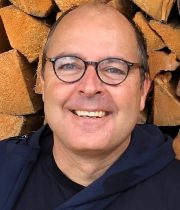
16:10– 17:10
One major challenge in CNS drug development is the identification of novel drug targets with higher potential for disease modification and improved clinical translatability
- What will (should) be the next generation of target identification strategies?
- What should target validation look like in the next decade?
- Should the “single target model” be questioned? Is there a future for multi-target
strategies?
Principal Scientist, reMYND
I started my independent research career at Duke-NUS Medical School (Singapore) in 2007, where my laboratory worked for 9 years on synaptic plasticity and memory in mouse models.
After a short stint at the Institute of Cancer Research (London, UK) where I developed image
processing software, I moved my lab to the University of Greenwich (UK) to work on stem cell models of neurodevelopmental disorders and pain. In 2019, I took a position at reMYND (Belgium), a biotech company that develops disease-modifying drugs for neurodegenerative
disorders. I head there the mitochondrial therapeutics and iPSC units and oversee
early drug discovery in the ALS program.

Preclinical
8:30 – 9:00
Opening Address & Keynote: EEG biomarkers: a predictive tool to bridge the gap between the preclinical and the clinical drug development
- EEG as a source of translational biomarkers for drug discovery & development
- Case study in Parkinson’s disease
- Case study in Rare diseases
Applications Specialist & Business Development, SynapCell
Maïtena holds a MSc in Management of Biotechnology and a Master’s degree in International business in Science. She joined SynapCell as Junior Business Developer in 2021 and was recently appointed as Applications Specialist. Her background provides her with dual skills to better understand the current needs of the biopharma industry towards drug discovery for CNS disorders. Her willingness to learn and to move EEG applications forward makes Maïtena a great asset from the valorization of SynapCell’s cutting-edge research from R&D projects to the development of new solutions’ scientific launch packages.

Head of Scientific Sales, SynapCell
Venceslas holds a PhD in Neuroscience and Neuropharmacology from the University of Bordeaux, France. He then undertook his post-doc at the Institute of pharmacology and toxicology at the University of Zurich. Venceslas has been working at SynapCell since 2012, first as Neuroscientist then as Head of Science. In May 2021, he was appointed Head of Product and Portfolio Management and moved to sales as Head of Scientific Sales in 2022. Venceslas therefore brings more than 10 years’ experience in drug discovery and brain disorders. As SynapCell’s Head of product and portfolio management, he is at the cutting edge of Neuroscience research through the implementation of drug discovery programs for customers or for internal R&D projects.

9:05 – 10:05
Is disease modification truly attainable for complex degenerative diseases like AD?
- Neurodegenerative diseases are complex, develop over decades and interact with other physiological process, such as ageing
- What would a cure of such a disease look like?
- What is there beyond amyloid and tau in the search for disease modifying treatment approaches?
Senior Medical Director, Lupin Neurosciences
Alla Zozulya Weidenfeller has a PhD in cellular biology and has been trained in Neuroimmunology in US and Germany. She is currently holding the position of Senior Medical Director at Lupin Neurosciences at EMEA headquarters in Zug, Switzerland heading medical affairs and serving as a medical director on clinical trials in rare disease.
She has around 10 years of local/regional/global Specialty and Rare Disease Pharma experience in Medical Affairs, including launches in various therapeutical areas and drug development programs. She has published over 27 peer-reviewed papers and review articles and book chapters, and run scientific programs in business across all stages of drug development.

The effect of CNS-acting drugs on rodent mismatch negativity is modulated by vigilance states
- Mismatch negativity (MMN) is a component of event-related potentials that is diminished in many neuropsychiatric disorders including schizophrenia.
- Central nervous system (CNS)-acting drugs often alter vigilance states, and it is not well understood how the drug-induced changes in sleep-wake behaviour affect MMN
generation. - The presentation will provide an overview of the recent rodent MMN research with a
special focus on vigilance state specific changes and discuss the methodological
aspects and future implications of the latest findings.
Scientific Lead, Transpharmation
Sandor has over 20 years’ experience in neuroscience research, published more than 20 research articles and was awarded with theprestigious Pickwick Fellowship of National Sleep Foundation to study the neurobiology of narcolepsy at Harvard Medical School. Prior to taking up his post at Transpharmation, Sandor held a research role at Cambridge University where he identified the abnormal changes in sleep and brain oscillations in Huntington’s disease as well as the drugs that can reverse them. As Scientific Lead at Transpharmation he is responsible for directing sleep-wake profiling and EEG assessment of novel, CNS acting compounds.

Novel strategies for reverse translation of temporal biomarkers for CNS drug development
- How can complex mood disorder diagnoses be deconstructed into behavioural and physiological attributes that can be recapitulated in
rodents? - What combinations of biomarkers are showing best promise for predicting treatment efficacy and/or response across different
pharmacological classes? - What novel technologies may help understand the longitudinal interactions between individual patient characteristics, disease progression
and treatment response /sensitivity more effectively?
Vice-President, Preclinical Research, COMPASS Pathways
Gary Gilmour is Vice-President of Preclinical Research at COMPASS Pathways. Gary studied Pharmacology at the University of Glasgow before
completing a DPhil in Neuroscience at the University of Oxford. He has built his career in the pharmaceutical industry and has led novel target and
discovery projects across a broad range of CNS indications. His approaches to drug discovery place high emphasis on translational validation and
establishing a deeper understanding of the biological substrates underlying different disease-related symptoms. Gary is a strong advocate for pre-
competitive scientific exchange, and his leadership has significant shaped research strategies on common problems in neuroscience drug discovery.
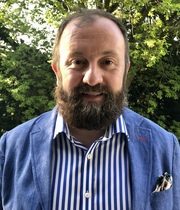
- How to select the in vivo preclinical models for neurodegenerative disorders?
- In which neurodegenerative disorder is the need for the greatest development?
- Before initiating the in vivo work, what are the main questions that drive your reasoning?
Director, UCB
- PhD in Behavioral Neuroscience (2001), University of Liège. Preclinical models for drug abuse.
- 20-year experience in Pharma industry.
- In vivo Lead, Director at UCB Pharma (Neuroscience).
- Lab Head: preclinical in vivo models for neurodegeneration: PD, HD, MS, AD, ALS, ataxia and
transgenic rodents. - Author and co-authors of scientific publications relating to preclinical models of disease.
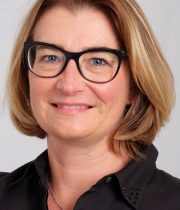
Clinical Studies
Registration
8:30 – 9:00
Opening Address & Keynote: EEG biomarkers: a predictive tool to bridge the gap between the preclinical and the clinical drug development
- EEG as a source of translational biomarkers for drug discovery & development
- Case study in Parkinson’s disease
- Case study in Rare diseases
Applications Specialist & Business Development, SynapCell
Maïtena holds a MSc in Management of Biotechnology and a Master’s degree in International business in Science. She joined SynapCell as Junior Business Developer in 2021 and was recently appointed as Applications Specialist. Her background provides her with dual skills to better understand the current needs of the biopharma industry towards drug discovery for CNS disorders. Her willingness to learn and to move EEG applications forward makes Maïtena a great asset from the valorization of SynapCell’s cutting-edge research from R&D projects to the development of new solutions’ scientific launch packages.

Head of Scientific Sales, SynapCell
Venceslas holds a PhD in Neuroscience and Neuropharmacology from the University of Bordeaux, France. He then undertook his post-doc at the Institute of pharmacology and toxicology at the University of Zurich. Venceslas has been working at SynapCell since 2012, first as Neuroscientist then as Head of Science. In May 2021, he was appointed Head of Product and Portfolio Management and moved to sales as Head of Scientific Sales in 2022. Venceslas therefore brings more than 10 years’ experience in drug discovery and brain disorders. As SynapCell’s Head of product and portfolio management, he is at the cutting edge of Neuroscience research through the implementation of drug discovery programs for customers or for internal R&D projects.

Important Legal, Technical and Social Aspects in CNS Therapeutics
- Data sharing, sensitivity, privacy and other issues affecting studies and cures
- How emerging technologies can help to reduce some of these problems very fast
- Is tech the only thing we need to consider? What about the whole user experience?
Global R&D Tech Head and Director of Innovation and Data Science, GlaxoSmithKline
Fausto has a double PhD (Information Technology and Computer Science), earning his second master’s and PhD at the University of California – Irvine. He has worked in multi-disciplinary teams and has over 20 years of experience in academia and industry. As a Physicist, Mathematician, Engineer, Computer Scientist, and HPC and Data Science expert, Fausto has worked on key projects at European and American government institutions and with key individuals, like Nobel Prize winner Michael J. Prather. After his time at NVIDIA corporation in Silicon Valley, Fausto worked at the IBM T J Watson Center in New York and now at GSK.
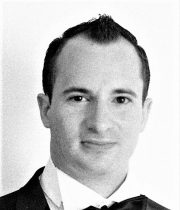
Morning Refreshments
Fluid and digital biomarkers in neurodegenerative disorders
- Definition of an ideal biomarker
- Current state and future of biomarkers
- Biomarkers: what, when, how, why?
- Accessibility of biomarkers
- Can digitalization of biomarkers increase accessibility?
- Biomarkers for precision medicine?
Global Medical Director CNS & Pain, Abbott
Dr Cigdem Turkmen is a Clinical Neurologist specialized in Movement Disorders with more than 20 years of experience in academia and pharmaceutical industry.
She is a Clinical Neurologist and has strong clinical development and medical affairs experience in Neuroscience and Rare disease fields.
Currently she is working as a Global Medical Director for CNS & Pain at Abbot. She has extensive experience in planning, executing, publishing, and submitting clinical development programs in pharmaceutical industry.
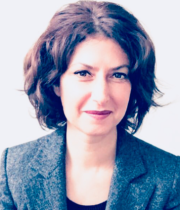
- Mismatch negativity (MMN) is a component of event-related potentials that is diminished in many neuropsychiatric disorders including schizophrenia.
- Central nervous system (CNS)-acting drugs often alter vigilance states, and it is not well understood how the drug-induced changes in sleep-wake behaviour affect MMN
generation. - The presentation will provide an overview of the recent rodent MMN research with a
special focus on vigilance state specific changes and discuss the methodological
aspects and future implications of the latest findings.
Scientific Lead, Transpharmation
Sandor has over 20 years’ experience in neuroscience research, published more than 20 research articles and was awarded with theprestigious Pickwick Fellowship of National Sleep Foundation to study the neurobiology of narcolepsy at Harvard Medical School. Prior to taking up his post at Transpharmation, Sandor held a research role at Cambridge University where he identified the abnormal changes in sleep and brain oscillations in Huntington’s disease as well as the drugs that can reverse them. As Scientific Lead at Transpharmation he is responsible for directing sleep-wake profiling and EEG assessment of novel, CNS acting compounds.

16:10 – 17:10
Utilising clinical biomarkers to enhance drug development in neuropsychiatric/ neurodegenerative diseases
- In which ways biomarkers can help us to forward translate from animal models to humans and back translate from humans to animal models?
- How is the new understanding of the patient (i.e. patient specific neurocircuitry dysfunction) driving the development of novel treatments and compounds?
- In which ways biomarkers will have an impact on psychiatric / neurodegenerative disorders clinical practice in the future?
- How can we ensure commonly used outcome measures have some relationship to real world functioning and the goals and wishes of patients and their caregivers?
Principal Biomarker Lead CNS / Director, Boehringer Ingelheim
Karla Allebrandt is a Director of Experimental Medicine Studies and acts as Principal Clinical Biomarker Lead in Early Clinical Development Projects in the CNS TA at Boehringer Ingelheim. Her work is centered around Precision Psychiatry, both through leading large external collaboration studies, as well as, in tailoring biomarker strategies for clinical trials. To support BI strategy, she investigates the clinical relevance of digital endpoints and neurophysiological markers in schizophrenia and major depression. She holds a PhD in Neurogenetics, and a Habilitation in Medical Psychology from the University of Munich (LMU), where she made key contributions to the field of Sleep & Circadian Rhythms.
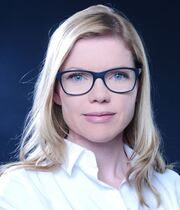
Drug Delivery
8:30 – 9:00
Opening Address & Keynote: EEG biomarkers: a predictive tool to bridge the gap between the preclinical and the clinical drug development
- EEG as a source of translational biomarkers for drug discovery & development
- Case study in Parkinson’s disease
- Case study in Rare diseases
Applications Specialist & Business Development, SynapCell
Maïtena holds a MSc in Management of Biotechnology and a Master’s degree in International business in Science. She joined SynapCell as Junior Business Developer in 2021 and was recently appointed as Applications Specialist. Her background provides her with dual skills to better understand the current needs of the biopharma industry towards drug discovery for CNS disorders. Her willingness to learn and to move EEG applications forward makes Maïtena a great asset from the valorization of SynapCell’s cutting-edge research from R&D projects to the development of new solutions’ scientific launch packages.

Head of Scientific Sales, SynapCell
Venceslas holds a PhD in Neuroscience and Neuropharmacology from the University of Bordeaux, France. He then undertook his post-doc at the Institute of pharmacology and toxicology at the University of Zurich. Venceslas has been working at SynapCell since 2012, first as Neuroscientist then as Head of Science. In May 2021, he was appointed Head of Product and Portfolio Management and moved to sales as Head of Scientific Sales in 2022. Venceslas therefore brings more than 10 years’ experience in drug discovery and brain disorders. As SynapCell’s Head of product and portfolio management, he is at the cutting edge of Neuroscience research through the implementation of drug discovery programs for customers or for internal R&D projects.

Transcytosis-mediated brain delivery for proteins, antibodies, oligonucleotides
and small molecules
- Choosing targets for delivery across the BBB and into CNS cells
- Optimizing biologics for improved transcytosis across the BBB
- Using viral and non-viral particles for brain transport of therapeutic molecules
Scientific Lead, Roche
Originally an M.D., Habib first worked in medical research in his home country before moving to Finland where he completed an M.Sc. in Biomedical Imaging, investigating nanoparticle transport across the BBB. After graduation, Habib researched cell invasion in glioblastoma, primarily using advanced light microscopy and image analysis. Later on, he moved to Norway to do a Ph.D. in focused ultrasound-mediated transport across the BBB, using medical technology, imaging and image analysis. After spending a year in Ireland where he researched siRNA delivery into the brain, he moved to Roche in Switzerland to continue working on the delivery of biologics across the BBB, with a strong focus on microscopy, image analysis and data analysis. At that time, Habib became fascinated with computational research and eventually moved to Roche in Poland, to expand his skillset and gain new perspectives in digital health and computer science applications in biomedicine.
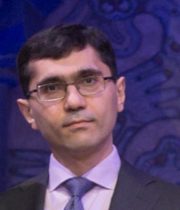
- Mismatch negativity (MMN) is a component of event-related potentials that is diminished in many neuropsychiatric disorders including schizophrenia.
- Central nervous system (CNS)-acting drugs often alter vigilance states, and it is not well understood how the drug-induced changes in sleep-wake behaviour affect MMN
generation. - The presentation will provide an overview of the recent rodent MMN research with a
special focus on vigilance state specific changes and discuss the methodological
aspects and future implications of the latest findings.
Scientific Lead, Transpharmation
Sandor has over 20 years’ experience in neuroscience research, published more than 20 research articles and was awarded with theprestigious Pickwick Fellowship of National Sleep Foundation to study the neurobiology of narcolepsy at Harvard Medical School. Prior to taking up his post at Transpharmation, Sandor held a research role at Cambridge University where he identified the abnormal changes in sleep and brain oscillations in Huntington’s disease as well as the drugs that can reverse them. As Scientific Lead at Transpharmation he is responsible for directing sleep-wake profiling and EEG assessment of novel, CNS acting compounds.

1-2-1 Meetings / Networking Break
1-2-1 Meetings / Networking Break
Novel strategies of drug delivery into the brain
- Different routes of administration to CNS – benefits and limitations
- Pathophysiological conditions in different disorders – impact on efficacy
- Influence of age on BBB and drug delivery into the brain
- Current situation, future vision – why we need novel strategies?
Sr. Director Medical Affairs, Taysha Gene Therapies
Dirk Schmitt is engaged as Senior Director of Medical Affairs for Taysha Gene Therapies. He has extensive experience in developing rare disease therapeutics in Europe. Before joining Taysha, Dirk Schmitt worked as the Global Core Medical Team lead and as a Senior Regional Medical Director, at Astellas Europe and as Country Lead DACh and Senior Medical Director for Audentes Therapeutics. He has also previously managed orphan drug launches at Ultragenyx, Pfizer, The Medicines Company, and was also engaged in Education Management.
